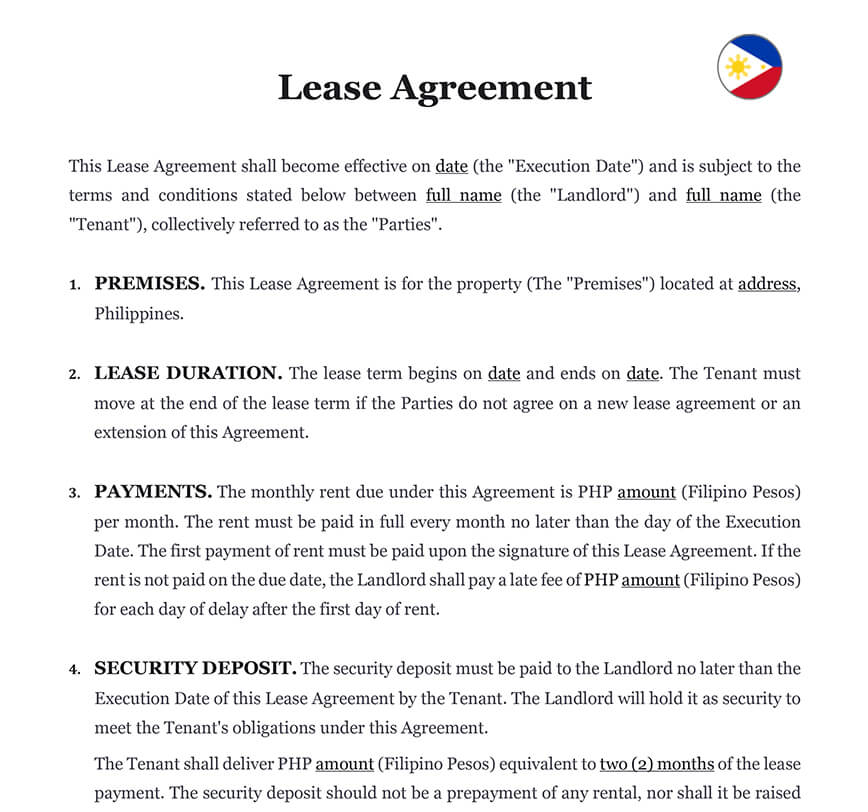Ready to use legal template
Drafted by experienced lawyers
Compliant with Filipino law
Ready to use legal template
Drafted by lawyers
Compliant with Filipino law
Home › Rent your property › Lease agreement
Learn more about Lease Agreement in Philippines
A Lease Agreement is a legally binding contract between a landlord and a tenant that outlines the terms and conditions of renting a property, including rent amount, duration, security deposit, and maintenance responsibilities. In the Philippines, lease agreements must comply with local property laws to protect both parties and prevent disputes. A well-drafted lease agreement ensures clarity, sets expectations, and provides legal security for both landlords and tenants. Download our expertly drafted Lease Agreement, designed specifically for use in the Philippines, and easily edit it in Word format to fit your rental needs. Secure your leasing transactions with a legally sound contract that protects your interests and ensures a smooth rental experience.
Table of contents
-
What is a lease agreement in the Philippines?
-
What is included in this Residential Lease Agreement?
-
Can foreigners lease property in the Philippines?
-
Can a landlord increase rent during the lease period?
-
Are there rent control laws in the Philippines?
-
Who pays for repairs and maintenance in a Residential lease?
-
What happens if a tenant breaches the lease agreement?
-
What is the required notice period for terminating a lease?
-
Can the landlord evict a tenant without a court order?
What is a lease agreement in the Philippines?
A lease agreement in the Philippines is a legal contract between a landlord and tenant that outlines the rental terms for a property. It specifies key details such as the monthly rent, payment due dates, and the lease duration. The agreement also includes responsibilities for maintenance and repairs, ensuring the property remains in good condition. It defines the rights and obligations of both parties, including rules regarding property use, subleasing, and termination. The lease also includes provisions about security deposits, rent increases, and dispute resolution. This contract provides protection to both parties by setting clear expectations and legal recourse in case of violations. It is important for tenants and landlords to carefully review the terms before signing. Understanding the clauses in the lease agreement helps prevent misunderstandings and potential conflicts. A well-drafted lease ensures a smooth rental experience for both parties.
What is included in this Residential Lease Agreement?
A typical residential lease agreement in the Philippines includes the following key components:
| ➤ Premises: Defines the specific location and address of the rental property covered under the lease. |
| ➤ Lease Duration: Specifies the start and end dates of the lease term and the conditions for renewal or termination. |
| ➤ Payments: Outlines the monthly rent amount, due date, payment terms, and applicable late fees for delayed payments. |
| ➤ Security Deposit: Details the required deposit amount, conditions for return, allowable deductions, and obligations for property condition upon move-out. |
| ➤ Property Rules: Lists the behavioral rules and usage restrictions for the property, including smoking, pets, guests, noise, and property damage policies. |
| ➤ Consent to Sublease: Prohibits the tenant from assigning or subleasing the premises without the landlord’s prior written approval. |
| ➤ Keys and Addenda: Covers the handover, duplication restrictions, replacement costs, and return of keys at the end of the lease. |
| ➤ Utilities and Services: Specifies the tenant’s responsibility for utility bills and clarifies that rent must still be paid even if services are temporarily disrupted. |
| ➤ Maintenance and Repairs: Requires the tenant to maintain the property and bear the cost of repairing any damages not due to normal wear and tear. |
| ➤ Alterations: Restricts the tenant from making any changes or renovations to the property without the landlord’s consent. |
| ➤ Termination: Describes the conditions under which the landlord may terminate the lease and the consequences, including forfeiture of the security deposit. |
| ➤ Governing Law and Jurisdiction: Establishes that the lease is governed by Philippine law and that disputes will be handled by Philippine courts. |
Can foreigners lease property in the Philippines?
1. Leasing Property in the Philippines as a Foreigner
Foreigners are allowed to lease property in the Philippines, but there are legal restrictions on land ownership. While non-Filipinos cannot own land, they may enter into long-term lease agreements. Under Philippine law, foreigners can lease land for an initial period of up to 25 years, with a possible one-time renewal for another 25 years. This is commonly used for residential, commercial, or agricultural purposes. The lease must be registered with the proper government agencies to be legally binding. Foreigners may also lease apartments, houses, or condominium units for residential use. These arrangements are more flexible and not subject to the same duration limits as land leases.
2. Residential Leases and Legal Considerations
When leasing a residential property, foreigners must ensure that their lease agreement complies with the Civil Code of the Philippines and other relevant housing laws. There is no maximum rental term for residential leases, allowing tenants and landlords to negotiate durations freely. The contract should clearly outline rent, duration, maintenance responsibilities, and termination conditions. It is advisable to work with a licensed real estate agent or legal advisor to review lease terms and confirm the landlord’s authority to lease the property. While foreigners may not own land, they are allowed to purchase condominium units under certain conditions.
For more details, refer to Philippine Department of Human Settlements and Urban Development.
🔗 A Land lease agreement is essential when leasing land for various purposes, including residential or commercial use. It outlines the terms of land rental, including the duration, rent amount, and conditions for property use.
- Remarks:
Foreigners must ensure their lease agreements comply with the Civil Code of the Philippines and other relevant housing laws. It is recommended that non-Filipinos consult with a licensed real estate agent or legal expert to avoid misunderstandings and ensure the agreement is legally binding. Violating lease terms may lead to legal challenges.
Can a landlord increase rent during the lease period?
1. Rent Increases During a Lease Term
In most cases, a landlord is not permitted to increase rent during the fixed term of a lease. The rental amount is contractually agreed upon and remains unchanged for the duration of the lease, unless the agreement includes a specific clause allowing adjustments. A rent escalation clause typically outlines the conditions under which rent may be increased, such as changes in inflation, property taxes, or other predefined triggers. Without such a clause, any rent increase would be considered a breach of contract. Therefore, tenants should review their lease carefully before signing. Any attempt to raise rent during the term without agreement may be challenged legally. Clear communication and written consent are essential.
2. Rent Adjustments at Renewal
Once the lease term ends, the landlord is generally free to propose a new rental rate for the renewal period. At this stage, both parties can negotiate new terms, including rent amount, duration, and conditions. Tenants are not obligated to accept a rent increase and may choose to vacate if they find the new terms unreasonable. In rent-controlled or regulated markets, local laws may limit how much the rent can be raised even at renewal. It’s advisable for tenants to research local rental regulations and consult with housing authorities if needed.
🔗 A Lease amendment is used when changes need to be made to the original lease agreement. This may include changes in rent, lease duration, or other terms that both parties agree to modify.
Are there rent control laws in the Philippines?
The Philippines has rent control measures in place to protect tenants from excessive rent increases, especially in low-income and urban housing areas. These regulations are primarily governed by the Rent Control Act of 2009, which aims to strike a balance between the rights of landlords and the welfare of tenants.
| ➤ Applicable Law: Rent Control Act of 2009 |
| ➤ Coverage Area: Residential units across the Philippines |
| ➤ Rent Threshold (Metro Manila): Applies to units with monthly rent of PHP 10,000 or less |
| ➤ Rent Threshold (Other Areas): Applies to units with monthly rent of PHP 5,000 or less |
| ➤ Maximum Rent Increase: Limited to 7% annually for covered units |
| ➤ Tenant Protection: Tenants may file complaints if rent increases exceed legal limits |
| ➤ Purpose: To protect low-income tenants from unjustified and frequent rent hikes |
Who pays for repairs and maintenance in a Residential lease?
1. Repair and Maintenance Responsibilities
In a standard residential lease, maintenance responsibilities are generally shared between the landlord and the tenant. The landlord is typically responsible for major repairs involving the structure of the property, plumbing, electrical systems, and anything necessary to maintain the premises in a habitable condition. On the other hand, tenants are expected to take care of day-to-day upkeep such as cleaning, replacing light bulbs, and maintaining basic hygiene. Minor repairs, like fixing a loose cabinet handle, usually fall under the tenant’s duties. If damages result from the tenant’s negligence or misuse, the tenant may be required to cover the repair costs. The lease agreement should always clarify these roles to avoid disputes.
2. Legal Expectations and Best Practices
Both landlords and tenants must understand their legal obligations under residential tenancy laws. Landlords are expected to ensure the property complies with minimum safety and habitability standards throughout the lease term. Tenants are expected to report major issues promptly to avoid further damage and may be liable if they fail to do so. Clear documentation of repair responsibilities in the lease agreement helps protect both parties legally and financially. It’s also important for tenants to request written confirmation from landlords for any major repairs done. For more information, refer to Philippine Housing and Land Use Regulatory Board (HLURB).
What happens if a tenant breaches the lease agreement?
1. Tenant Breaches and Landlord Rights
When a tenant breaches the lease agreement, the landlord is entitled to enforce the terms outlined in the contract. Common violations include failure to pay rent on time, causing damage to the property, or breaching specific clauses such as subletting without permission. Typically, the landlord will begin by issuing a written notice of breach, which outlines the problem and provides a deadline for the tenant to resolve it. This notice serves as a formal warning and is often required before any further action can be taken. If the issue is resolved within the stipulated time, the lease can continue. However, persistent or serious breaches may justify stronger legal measures.
2. Legal Action and Eviction Procedures
If a tenant fails to remedy the breach, the landlord may proceed with lease termination and eviction. Eviction must follow proper legal procedures, which typically involve filing a case with the local housing or tenancy tribunal. The landlord may also seek compensation for unpaid rent, repair costs, or other losses caused by the breach. It is important that all actions taken are consistent with local tenancy laws to avoid claims of wrongful eviction. In some jurisdictions, mediation may be required before court proceedings. Clear documentation of the breach and communication with the tenant will support the landlord’s case.
🔗 A Sublease agreement occurs when the tenant of a rental property leases it out to another individual. It is crucial for ensuring that all terms are agreed upon between the original tenant and the subtenant.
- Remarks:
If a tenant breaches the lease agreement, the landlord is entitled to enforce the terms, which may include eviction or legal action. Both parties should be aware of their rights and obligations to avoid complications. Resolving breaches promptly through written communication can prevent further escalation.
What is the required notice period for terminating a lease?
Terminating a lease in the Philippines requires careful attention to the terms outlined in the lease agreement. While the law provides a general framework, specific provisions in the contract often dictate the notice period required. Both tenants and landlords must provide sufficient notice to avoid penalties or legal issues. Below is a summary of the essential information:
| ➤ General Notice Period: Typically 30 days' notice is required before the intended end date of the lease. |
| ➤ Who Can Give Notice: Either tenant or landlord may issue a termination notice. |
| ➤ Contractual Terms Prevail: The lease agreement may require a longer notice period, especially for long-term leases. |
| ➤ Importance of Compliance: Failure to follow the agreed notice period may result in penalties, forfeiture of deposit, or legal disputes. |
| ➤ Form of Notice: Notice should be in writing and preferably acknowledged by both parties. |
| ➤ Early Termination Clauses: Some leases include specific conditions or fees for early termination — check your contract. |
🔗 A Notice to vacate is a formal written notice given by either the tenant or the landlord, indicating the intention to terminate the lease and vacate the premises.
Can the landlord evict a tenant without a court order?
1. Legal Eviction Process in the Philippines
In the Philippines, landlords are not allowed to evict tenants without first securing a court order. If a lease has expired or if a tenant has breached the lease terms such as failing to pay rent or causing damage the landlord must initiate legal proceedings. This involves filing an unlawful detainer or ejectment case with the appropriate court. Only after the court has ruled in favor of the landlord can an eviction be lawfully carried out. Attempting to evict a tenant without due process is considered illegal. Landlords must also issue proper notices, giving the tenant time to respond or comply. Skipping these steps can lead to the case being dismissed or legal sanctions against the landlord.
2. Consequences of Illegal Eviction
Self-help eviction tactics such as changing the locks, cutting utilities, or physically removing a tenant’s belongings are strictly prohibited under Philippine law. These actions can lead to criminal and civil liabilities for the landlord. Even if a tenant overstays after the lease expires or fails to pay rent, the landlord must respect the judicial process. Tenants are protected by laws ensuring due process and fair treatment, regardless of the nature of the dispute. The court may also grant the tenant time to vacate the property depending on the circumstances.
🔗 An Eviction notice is a formal notification issued to a tenant who has violated the terms of the lease. It outlines the reasons for eviction and the timeline for vacating the property.
Conclusion
In conclusion, a lease agreement is an essential legal document that outlines the terms of the landlord-tenant relationship. It ensures that both parties understand their rights and responsibilities, including payment terms, maintenance obligations, and property use rules. Key clauses such as lease duration, security deposit, and termination conditions help prevent misunderstandings. Tenants must adhere to property rules, including restrictions on subleasing and alterations. Clear communication is crucial when issues arise, and written consent from the landlord is required before making any changes. In case of disputes, it is important to follow the procedures outlined in the contract to resolve conflicts. Tenants should maintain the property well and address any issues promptly to avoid penalties. It is always recommended to carefully review the lease agreement and consult a legal professional to ensure all terms are understood. By being proactive, tenants can enjoy a smooth rental experience while safeguarding their legal interests.
SPECIAL OFFER
Landlord
10 Document Package
Essential documents for managing rental property in the Philippines
Share information
Why Themis Partner ?
Make documents forhundreds of purposes
Hundreds of documents
Instant access to our entire library of documents for Philippines.
24/7 legal support
Free legal advice from our network of qualified lawyers.
Easily customized
Editable Word documents, unlimited revisions and copies.
Legal and Reliable
Documents written by lawyers that you can use with confidence.




